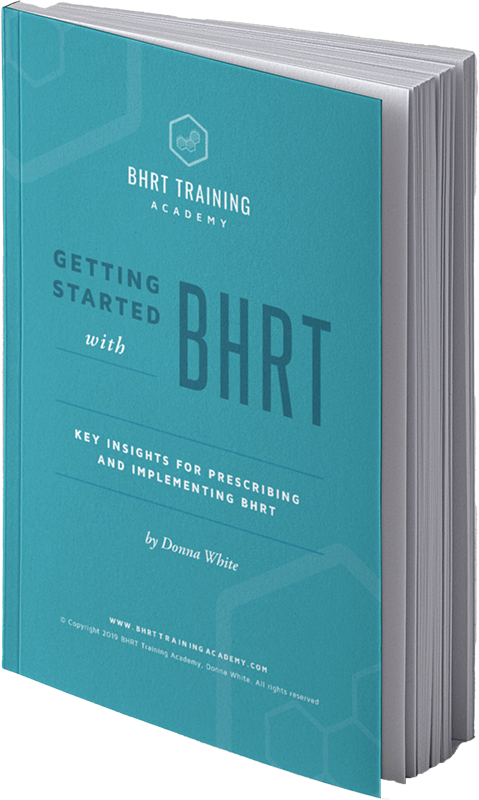Are Bioidentical Hormones FDA Approved?

The quick answer is yes, bioidentical hormones are FDA approved but hold on, this is a very controversial and somewhat complex topic that requires more explanation. Some bioidentical hormones are manufactured by drug companies, are approved by the FDA, and sold in standard doses. On the other hand some bioidentical hormone preparations are made at special pharmacies called compounding pharmacies. These compounded hormones are made on a case-by-case basis for each patient as ordered by licensed prescribers. Since compounded bioidentical hormones are “custom-made” for each individual patient, they aren’t approved by the FDA nor are they required to be. However, they do contain FDA approved hormones in the formula.
Why Aren’t Compounded Bioidentical Hormones FDA Approved?
The US Food and Drug Administration (FDA) has approved a number of formulations of bioidentical estradiol and progesterone, which are molecularly identical to the structure of the hormones generated by the human body. The FDA does not prohibit the compounding of bioidentical hormones. The FDA just doesn’t approve any compounded products, for any condition, because those products aren’t standardized. That doesn’t mean that compounding is bad or compounded hormones are not safe. After all, whether compounded or manufactured, if the hormones are indeed bioidentical as opposed to non-bioidentical, they are the same hormones. For example, both the FDA-approved as well as compounded hormones come in a variety of doses and routes of delivery (pills, creams, gels, sprays, and vaginal inserts).
Why Is There So Much Controversy?
My opinion is that in the early days of BHRT’s history here in the US a number of experts pointed out that research indicates bioidentical hormones are safer than non-bioidentical hormones. This is well substantiated. However, it seems that some medical organizations took that to mean proponents were telling the public that compounded hormones are safer than manufactured hormones. This stirred up a lot of trouble and confusion.
Another issue that opponents of compounded hormones have is that FDA approved hormones have been thoroughly tested for safety and purity to be sure each dose has the same amount of hormones. This is true. Also, they contend that the lack of FDA oversight for compounded hormones generates additional risks regarding the purity and safety of custom compounded bioidentical hormones. However, this really does not mean that compounded hormones are unsafe.
Compounding pharmacists have been preparing medications with an excellent track record of safety and effectiveness prior to the advent of mass-produced pharmaceuticals. Our health care system could not function without the expertise of compounding pharmacies. According to the American Pharmacy Association and the National Association of Community Pharmacists, compounding is done in 90% of all hospital pharmacies and 80% of all independent pharmacies. There are strict regulations and oversight of compounding.
- Compounding pharmacies are regulated by each state’s pharmacy board and by the Pharmaceutical Compounding Accreditation Board.
- Each state’s regulations require consistency in purity and dosage.
- The hormones compounding pharmacists use are regulated by the U.S. Pharmacopoeia and the Code of Federal Regulations, which requires purity testing.
- The prescriptions filled at compounding pharmacies are not FDA regulated or FDA approved but do contain hormones that are FDA approved.
- The hormones used by compounding pharmacies are obtained from FDA inspected and approved facilities.
- Compounded hormones do not require FDA approval since they are not mass-produced. (FDA approval does not guarantee medication safety as evidenced by drug product recalls.)
An Example Of The State Of Confusion
While updating my research for this topic I ran across a prime example of the confusion over bioidentical hormones. In a press release about a new medication Brian Bernick, co-founder and director of TherapeuticsMD, said “The approval of Bijuva represents an important and new opportunity for menopausal women suffering from moderate to severe vasomotor symptoms,”. “Menopausal women and their health care providers have been seeking bioidentical combination therapies for many years without an FDA-approved option.” This just is not exactly correct. Estradiol patches have been around for years, so have oral and vaginal progesterone. It is so odd to see such confusion. I remember when I ran the hormone program for a family practice 10 years ago, one of the reps for an estradiol gel came calling. When I asked him if he knew that his product is bioidentical, he had no clue and promptly decided to change his sales pitch and call on integrative practitioners!
Compounded Hormones Versus Manufactured Hormones
The use of the compounded hormones is very common in the U.S. by women in menopause. The North American Menopause Society (NAMS) reports that about 1.4 million women are using this treatment. NAMS notes that is 40% of all prescriptions for hormone therapy in women who are in menopause. Personally, I use both compounded and conventional. I use an estradiol patch, which is amazing for hot flashes, and I add to that a combination of progesterone and estriol cream. I use a separate cream for testosterone.
Here are some things to consider when you are making your decision as a prescriber whether to write for compounded or conventional manufactured hormones:
- In many instances compounded hormones are more affordable. Estradiol vaginal cream can cost well over $300 while compounded estradiol vaginal cream may start at around $50. (The same goes for testosterone gels for men.)
- Some insurance companies may be more likely to cover FDA approved hormones. However, now some compounding pharmacies file insurance too.
- Compounding hormones allow the prescriber to order any strengh of the hormone he or she wants for the patient.
- Compounding allows providers to order more than one hormone in a combination. For example, estrogen(s) can be combined with progesterone and even androgens too if desired.
- Compounding can be useful for patients who are allergic to an additive in a manufactured medication.
- When deciding between Prometrium ® and compounded oral progesterone, consider that compounding may be less expensive. Prometrium ® is suspended in peanut oil – a challenge for patients with a peanut allergy. Compounded progesterone can be compounded into a slow release form. This may be more helpful for women with sleep disturbances.
- For some patients a sustained-release form of estrogen such as a patch or pellet may be more effective for severe vasomotor symptoms or migraines.
Accredited Compounding Pharmacies
When referring your patients to compounding pharmacies make sure that you steer them in the right direction. The International Academy of Compounding Pharmacists, suggests that patients look for accredited compounding pharmacies listed on the web site of the Pharmaceutical Compounding Accreditation Board (PCAB).
Which HRT Is Bioidentical And Which Brands Are Not?
Not only is there confusion about the difference between conventional manufactured HRT and compounded hormones, people do not know which brands of HRT are bioidentical. A number of times patients in the practices I have worked with have asked if we could help them get off their synthetic hormones. When we inquired as to what they are taking we found out it was an estradiol patch. These patients assumed it was not bioidentical since the bought it at a conventional pharmacy. While consulting with practitioners I have had requests by gynecologists to come to the drug cabinet to show them which brands are bioidentical. Therefore, I realized there is a lot of educating to be done. You can get my chart, “Hormone Replacement Prescriptions – Compounded and Conventional”. It lists popular HRT brands and compounded hormones and will show you which are bioidentical.
Whether you use conventional or compounded hormones the most important thing is that you use bioidentical hormones. To benefit your patients even more, take it a step further, get advanced training in BHRT, learn about hormone testing, and study nutrition and supplementation that support hormone balance. You will be glad you did and your patients will thank you.

Get the quick read ebook,
Getting Started with BHRT -
Key Insights to Prescribing and Implementing BHRT.
CME's - Earn while you learn.
